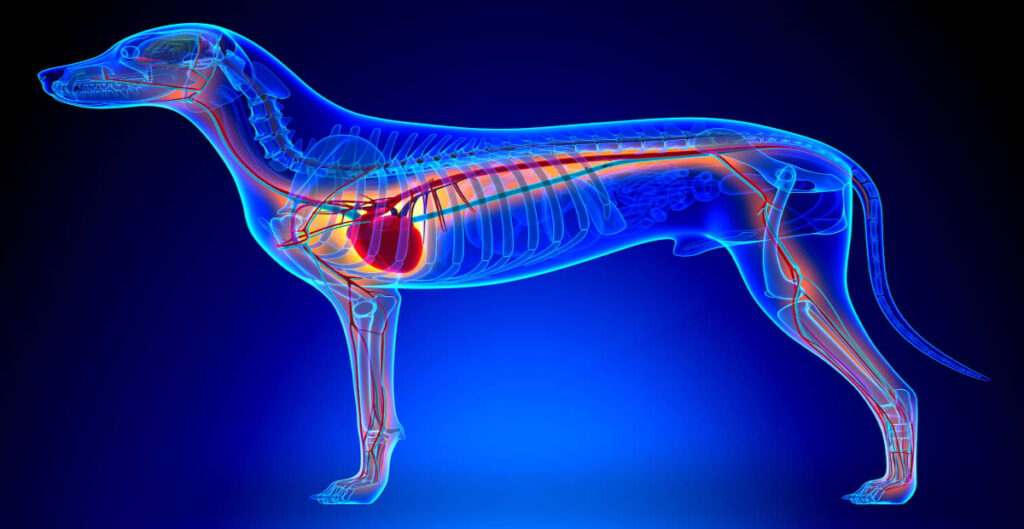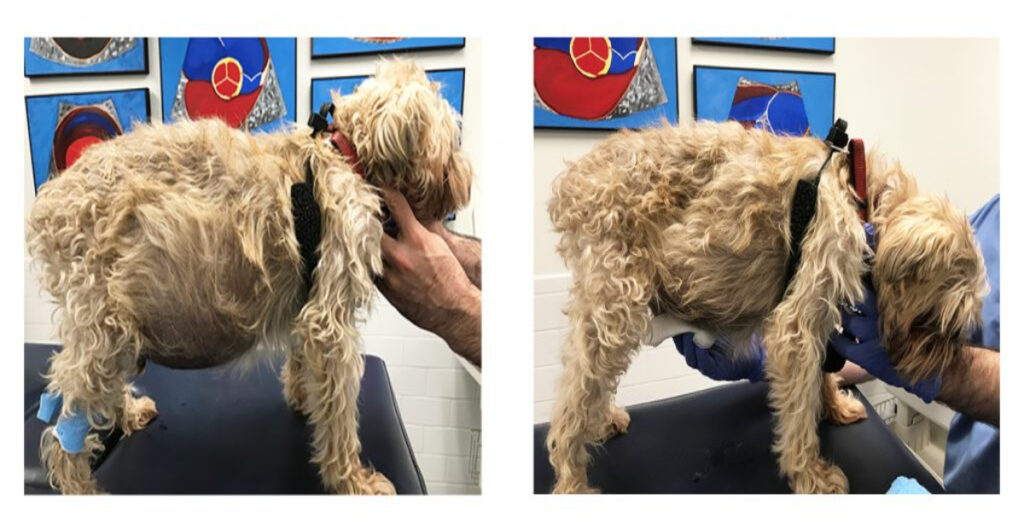
Just as heart disease is a major health concern for humans, it also affects our canine companions. In fact, 10% of all dogs will develop heart disease in their lifetime. Some breeds such as Cavalier King Charles Spaniels have even higher rates due to genetic factors. Awareness of risk factors, signs of problems and prevention methods is key to protecting your dog’s heart health in Greece.
Common Heart Diseases in Dogs

Several heart diseases are observed in the dog population in Greece.
Mitral valve disease
The mitral valve controls the flow of blood between the left atrium and the ventricle. Mitral valve disease (MVD) causes regurgitation and leakage. It is more common in small breed dogs. Symptoms include coughing, fatigue and difficulty breathing. Medicines can help support heart function, but the prognosis depends on the severity.
Dilated cardiomyopathy
This condition causes the heart to enlarge and weaken, resulting in inadequate pumping. It mostly affects large breeds like Dobermans, but it can affect any dog. Fainting, arrhythmias, and congestive heart failure may occur. Medication and diet changes help manage this incurable disease.
Congenital anomalies
Some dogs are born with malformations of the heart or blood vessels. Defects can include faulty valves, abnormal openings, or malformed arteries. Depending on the severity, these defects can often be surgically repaired.
Arrhythmias
Arrhythmia is an abnormal heart rhythm. Bradycardia is a slower than normal pulse while tachycardia is a fast heart rate. Underlying issues such as thyroid disease can cause arrhythmias. Antiarrhythmic drugs or pacemakers may be treatment options.
Risk Factors for Heart Diseases

Certain factors increase a dog’s chance of developing heart problems in Greece:
- Age – The risk increases after about 7 years
- Breed Predisposition – Small and large breed dogs prone to certain defects
- Genetics – Birth defects are often inherited
- Diet – Too much fat/sodium can strain the heart
- Obesity – Excess weight puts pressure on the heart
- Activity level – Insufficient exercise weakens the heart muscle
- Other diseases – Diabetes, hypothyroidism, etc. may affect the heart
- Knowing your dog’s predispositions allows you to better watch for signs of trouble.
Prevention of heart disease in dogs

While some heart disease is inevitable, focusing on prevention starting in puppyhood is important:
- Feed a high-quality diet appropriate for your dog’s size and activity level
- Avoid excessive treats and table scraps
- Maintain a lean body condition with plenty of exercise
- Get annual exams to check heart health starting at age 7
- Follow heartworm and flea/tick prevention protocol
- Watch for signs of illness and consult a veterinarian immediately
- Consider breed-specific cardiac screening tests
- With careful preventive care, the onset of heart disease can potentially be significantly delayed.
Signs of heart problems in dogs

Dog owners in Greece should watch out for these common symptoms:
- Fatigue or reduced stamina
- Fainting or collapsing
- Persistent cough or gagging
- Rapid or labored breathing
- Weight loss or loss of appetite
- Fluid accumulation in the abdomen or lungs
- Leg edema (swelling)
- Pale or blue gums
- Catching signals early allows for faster intervention. Call your vet right away if your dog shows any worrisome symptoms that could indicate heart problems.
Diagnosis of heart disease in Greek dogs

Veterinarians have several tools to assess a dog’s heart health:
Physical Examination
Listening to the heart and feeling for pulses can detect murmurs or irregular heartbeats. The vet also assesses for related signs such as coughing and lethargy.
Laboratory tests
Blood provides details of organ function. Specific cardiac enzyme levels help identify heart damage.
Chest X-rays
X-rays allow assessment of the size and shape of the heart for signs of enlargement or fluid in the lungs.
Echocardiogram
This heart ultrasound allows veterinarians to visualize the valves, chamber size, wall thickness and blood flow in detail.
EKG
Electrocardiograms measure the heart’s electrical activity to detect abnormal rhythms.
Holter monitor
For extended EKG monitoring, a portable Holter device can be worn to record heart rates during normal activity.
Veterinarians may recommend a visit to a veterinary cardiologist for further specialized testing if a problem is suspected.
Treatment of heart disease in dogs

There are several treatments to treat heart disease in dogs:
- Medicines – Angiotensin-converting enzyme (ACE) inhibitors, beta-blockers and diuretics are usually prescribed. Other medications may include antiarrhythmics or vasodilators.
- Dietary change – Salt and fat intake is reduced to optimize heart health.
- Surgery – Defects such as valve malformation can be repaired. Pacemakers may be implanted for arrhythmias.
- Invasive Procedures – Catheterized balloon valvuloplasty can open narrowed valves.
- The vet will tailor the treatment plan based on the dog’s specific condition, overall health and test results. For advanced disease, medications help manage symptoms and delay further progression.
Caring for dogs with heart disease

If your dog is diagnosed with heart disease, you play a key role in managing his condition:
- Give all medications as directed
- Feed the prescribed heart-healthy diet
- Monitor for improvement/worsening of symptoms
- Limit exercise to recommended levels
- Keep up with vet appointments for check-ups
- Learn to monitor your breathing rate and other parameters at home
- Help your dog maintain a healthy weight
- Avoid stressful situations that could trigger clinical signs
- Give love and support!
- While heart disease shortens lifespan, following a treatment plan helps dogs maintain a good quality of life for as long as possible.
conclusion
From congenital defects to progressive valvular disease, heart problems affect dogs of all ages and breeds in Greece. Focusing on prevention and early investigation of any possible symptoms is important for early diagnosis and treatment. Advances in veterinary cardiology provide more options in the management of canine heart disease. With careful owner care and subsequent veterinary guidance, most dogs with heart disease can still live happy lives alongside their beloved humans.
FAQS
The most common heart diseases in dogs in Greece are mitral valve disease, dilated cardiomyopathy, congenital defects such as defective valves and arrhythmias. Certain breeds are genetically predisposed to developing these conditions.
Prevent heart disease by feeding a nutritious diet, maintaining a healthy weight, getting annual vet checkups over age 7, administering proper heart and flea/tick medications, and watching for any signs of heart problems. Breed screening tests also help detect problems early.
Watch for symptoms such as fatigue, cough, fainting, breathing problems, weight loss, fluid build-up in the lungs or abdomen, leg swelling, pale gums, and decreased stamina or appetite. Call your vet right away if you notice any of these.
Veterinarians use chest X-rays, EKGs, echocardiograms, blood tests, enzyme levels, and physical examinations of pulse and breathing to diagnose heart disease. A visit to a veterinary cardiologist may be recommended for further diagnosis.
Follow your vet’s treatment plan closely, including medications, diet changes, and exercise limits. Monitor your dog’s symptoms and comfort at home. Attend regular check-up appointments. Avoid stressful situations. Focus on keeping your dog happy and surrounded by loved ones.
